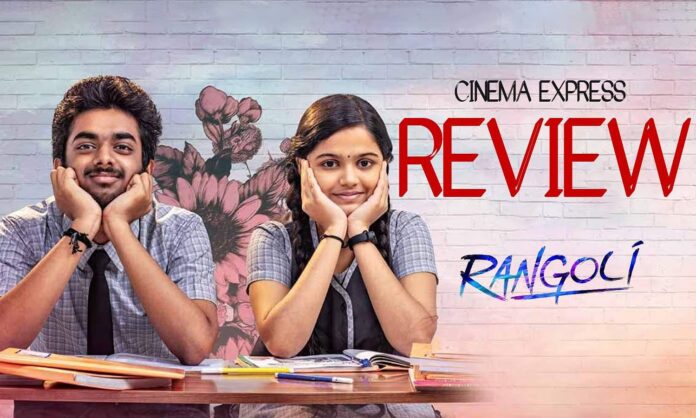A flute that hums a melody in the background, the verandah of a school, and the promenading pupils in their striped uniforms… could there be any narrative left untold in this familiar setting? It is into this familiar world that Vaali Mohan Das takes us with his recent directorial Rangoli. Now, when entering a world we have seen multiple times before, the makers should either surprise us or make us feel exasperated. However, Rangoli relinquishes both these possibilities and ends up eliciting a sort of nothingness!
Director: Vaali Mohan Das
Cast: Hamaresh, Muruga Doss, Prarthana, Amit Bhargav, Sanjay
The ritual of linking colours to school life, in accordance with positive connotations, has been as old as time. Does every child really bear such colourful stories from their childhood? However, the life of Sathyamoorthi (Hamaresh) isn’t as vibrant as a rangoli. His parents, amid a grappling life, shift his schooling from a government school to a private school. After that, the film takes the route of a romcom with warring suitors for the same girl. The film also ticks the other tropes like affluent classmates ostracising him; a preachy teacher who is more into preaching than teaching, a fair-skinned classmate being the antagonist, and a girl, whose entire existence is defined just by slow-motion shots.
The film is centred around Sathyamoorthi’s family, and the conflicts of the film either bring the family joy or pain. There is an overworked father who tries hard to make ends meet and to pay his son’s school fees, a motormouth mother who is forced to work to support her family, and a school-drop-out sister helping the parents. Of course, there is a moneylender in play too, but the film subverts the cliches, and instead of making him cold-hearted, the makers paint him as a compassionate individual.
Moving on from one plot development to the next, we are not sure if any of them leave a considerable impact. The heartwarming moments shared between family members, the portrayal of a kind-hearted moneylender, Sathya’s love for Paru (Prarthana), or his rivalry with Gowtham… none of these seemingly layered scenes resonate with us. These elements fail to leave a lasting impression. Forget leaving lasting emotions, they don’t even incite immediate emotions. We just go through the motions without really being invested in the proceedings.
When we watch the characters get teary or happy, we realise that the whole narrative has pushed us into a state of impassiveness, and none of these moments or characters transcend into our psyche. When we question these characters’ intentions and purposes, Rangoli makes us realise these merely exist because a film needs to have a particular runtime, and there is nothing else driving it forward. As it moved from one scene to another, it almost made me ask, “All this for what?”
In the opening scene, there’s a cricket match between two groups of friends from the government school, competing for control of the cricket ground. Sathya remarks to his team member, “Today they will ask us to leave the ground; tomorrow it will be our land. Is that acceptable?” This political consciousness has great potential. It has opportunities for exploration, especially when he is labelled ‘local’ in his new school. But this promise is just diluted soon after. And the attempt to trace the difference between public and private education also fades into thin air. Even when Sathya is trying his best to fit into the new world, we watch it unfold with a lot of indifference because the writing pulls him back. Also, why are the schoolchildren not behaving like teenagers? Why do we not allow the kids to act like kids?
An important redeeming factor of Rangoli is definitely the performance of the cast. Sathya and his family shoulder this film with their performances. Another highlight of the film is the music by Sundaramurthy KS that ensures the innocence of childhood is beautifully encompassed within the film.
Although we may have grown tired of the cliché scenes of schoolyards and uniforms set to calming music, there’s something timeless about this trope that resonates with the inner child within us. With that in mind, Rangoli offers a chance to relive memories of blackboards, friendships, lessons, and crowded hallways. However, if you’re looking for something more substantial in your life than just a trip down memory lane, it is easier done within our own minds rather than watching it unfold in a not-so-pleasing way in Rangoli.
#immature #tale #cold #core #Cinema #express

